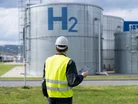Honeywell's Hydrogen Journey to Net Zero Manufacturing

Manufacturers are enthusiastically adopting alternative sources of fuel, such as hydrogen. From June – December 2023, the global hydrogen development platform grew by 35%.
However, there are some challenges for manufacturers to overcome in implementing hydrogen-capable combustion systems and tracking data from their equipment to reduce emissions.
Dale Smith, Growth Leader for Digitalisation / Energy Transition Solutions at Honeywell’s Thermal Solutions, spoke exclusively with Manufacturing Digital to discuss this further.
Honeywell’s innovation into hydrogen manufacturing
Founded in 1906, Honeywell manufactures a range of technologies. The company is based in Charlotte, North Carolina, and is developing new smart manufacturing solutions with the goal of improved safety and advanced sustainability in every area of its production.
Honeywell is leading the net zero advance with its hydrogen-capable burner technologies.
The burners are combined with DG Smart Transmitter, hydrogen blending trains and burner management systems supported by Thermal IQ software. Together, they help manufacturers collect real-time data to:
- Automate safety checks
- Monitor performance metrics
- Analyse data.
Ultimately, this can support the use of clean combustion technologies, over fossil fuels.
Harnessing hydrogen for Net Zero targets in manufacturing
"The world is moving towards achieving Net Zero targets, with the UK aiming to reach the goal by 2050. To reach this target, the UK Government has turned to implementing clean energy sources such as hydrogen to accelerate their path to carbon neutrality – it has committed to eleven new production projects helping to place the UK at the forefront of the hydrogen industry and bring progress towards net zero ambitions,” said Dale. “Additionally, significant global efforts are underway to bolster hydrogen infrastructure, highlighted by the US Department of Energy's recent US$7bn investment in seven Hydrogen Hubs. However, companies are facing challenges in implementing hydrogen-capable combustion systems and tracking data from their equipment to drive operational efficiencies and reduce emissions.”
In order to implement successful hydrogen projects, Dale advises that companies need to adopt advanced burner technologies, including hydrogen-capable and ready burners.
These burners, combined with hydrogen blending trains and burner management systems, help manufacturers to:
- Capture real-time data to automate safety checks
- Monitor performance metrics
- Analyse data, ultimately supporting the implementation of clean combustion technologies.
“Using these technologies enables manufacturers to achieve their low emissions objectives, meet emission standards, while maximising productivity. Other benefits of using burner technologies include, improved thermal efficiency, increased processing rates, higher product quality, reduced flue gas volumes and lower emissions."
******
Make sure you check out the latest edition of Manufacturing Digital and also sign up to our global conference series - Procurement & Supply Chain 2024 & Sustainability LIVE 2024
******
Manufacturing Digital is a BizClik brand.


